| Portuguese Communist Party |
|---|
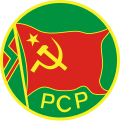 |
This is a list of persons that are or were supporters or members of the Portuguese Communist Party.
| Portuguese Communist Party |
|---|
 |
This is a list of persons that are or were supporters or members of the Portuguese Communist Party.

The Portuguese Communist Party is a communist, Marxist–Leninist political party in Portugal based upon democratic centralism. The party also considers itself patriotic and internationalist, and it is characterized as being between the left-wing and far-left on the political spectrum.

Álvaro Barreirinhas Cunhal was a Portuguese communist revolutionary and politician. He was one of the major opponents of the dictatorial regime of the Estado Novo. He served as secretary-general of the Portuguese Communist Party (PCP) from 1961 to 1992. He was one of the most pro-Soviet of all Western Europe communist leaders, often supporting the Soviet Union's foreign policies, including the Soviet invasion of Czechoslovakia in 1968. During the 1970s, Cunhal supported Soviet leader Leonid Brezhnev’s political agenda, and strongly opposed Mikhail Gorbachev’s perestroika policies in the 1980s.

Carlos Alberto do Vale Gomes Carvalhas, GCC is a Portuguese economist and politician and former Secretary-General of the Portuguese Communist Party (1993–2004), succeeding the historical leader Álvaro Cunhal.

The 1991 Portuguese presidential election was held on 13 January.
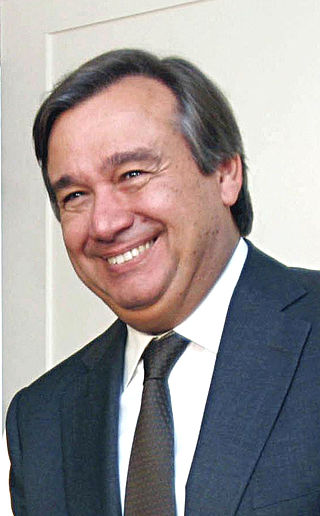
The 1995 Portuguese legislative election took place on 1 October. The election renewed all 230 members of the Assembly of the Republic.

Constituent Assembly elections were carried out in Portugal on 25 April 1975, exactly one year after the Carnation Revolution. The election elected all 250 members of the Portuguese Constituent Assembly.

The 1976 Portuguese legislative election was held on Sunday 25 April, exactly one year after the previous election, and two years after the Carnation Revolution. With a new Constitution approved, the country's main aim was economic recovery and strengthening its democratic institutions. The election renewed all 263 members of the Assembly of the Republic.

This is a historical timeline of Portugal.
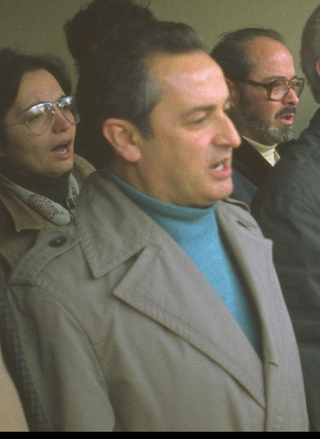
Octávio Floriano Rodrigues Pato was a Portuguese communist leader.
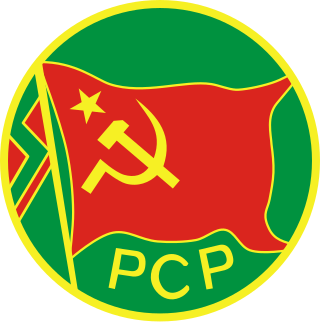
The history of the Portuguese Communist Party, spans a period of 102 years, since its foundation in 1921 as the Portuguese section of the Communist International (Comintern) to the present. The Party is still an active force within Portuguese society.
Militão Bessa Ribeiro, born in Murça, was a Portuguese politician, member of the Portuguese Communist Party, during the illegality, that struggled against the fascist regime of Estado Novo.

This is a table of the electoral results of the Portuguese Communist Party. Despite the Party had been founded in 1921, the party experienced little time as a legal party, being forced into clandestinity after a military coup in 1926. In the following decades, Portugal was dominated by the dictatorial regime led by António Oliveira Salazar, that kept the Party illegal. Although the regime allowed elections during some periods, the Party, given its illegal status, could never legally enter the electoral process and the heavy manipulation of the electoral results never allowed a democratic candidate to win. The regime would only end in 1974, with the Carnation Revolution, that implemented broad democratic changes in the country.
The 6 June 1975 Micalense Farmers' Protest, or simply the 6 June, was an organized protest by Micalense farmers, in Ponta Delgada, the capital of the then-Autonomous District of the same name, following the Carnation Revolution. Inspired by rural property-owners and right-wing factions, the protest forced the resignation of the civil governor and inspired a series of terrorist acts, that ultimately led to the creation of the Regional Junta of the Azores, and the basis of modern Azorean politics.

Virgínia Moura (1915-1998) was a Portuguese anti-government activist and feminist, opposed to the authoritarian regime known as the Estado Novo. As a member of the Communist Party, she was arrested on 16 occasions for her activities. She was the second Portuguese woman to qualify as a civil engineer.
Margarida Tengarrinha is a Portuguese teacher, writer, artist and illustrator. As a member of the Portuguese Communist Party (PCP) she was active as an opponent of the authoritarian Estado Novo regime that governed Portugal between 1926 and 1974, playing a role in document forging and publication of the Party's magazine Avante!. She spent two years in Moscow with the future leader of the PCP, Álvaro Cunhal, and then worked in Bucharest, Romania on a radio station broadcasting to Portugal. After the overthrow of the regime, she became a deputy in the Assembly of the Republic. More recently she has written memoirs, taught at a Senior University, illustrated books and exhibited works of art.

Maria Alda Nogueira (1923–1988) was a communist and feminist activist who opposed Portugal's Estado Novo regime and spent nine years as a political prisoner. After the overthrow of the Estado Novo she became a parliamentary deputy, serving in the National Assembly for a decade.
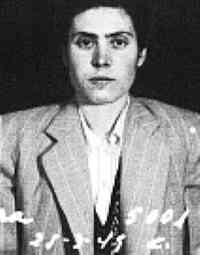
Sofia Ferreira was a prominent member of the Portuguese Communist Party (PCP). She was imprisoned for more than 13 years for her opposition to the Estado Novo regime.